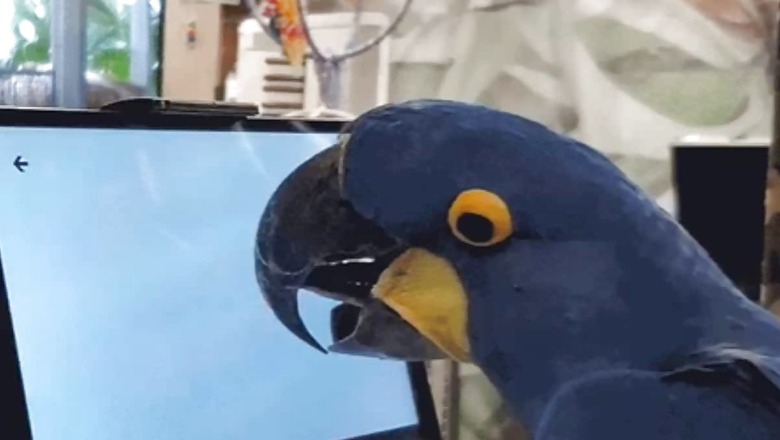
views
Parrots are known for their intelligence and ability to mimic sounds and behaviours. But do you know that they can also play games on touch screens? Today, the usage of touch screens have become an integral part of human life in a relatively short period of time. From talking on video calls with loved ones and doing online shopping to playing games and using them for work, touch screens offer a more intuitive and user-friendly way to interact with technology compared to traditional keyboards and mice.
It has made technology more accessible to people of all ages and abilities. It has undeniably transformed the way we interact with technology and the world around us. But we never thought that animals were going to use touchscreens. Yes, you are reading that correctly. In a new research, Northeastern assistant professor Rébecca Kleinberger, Megan McMahon, an undergraduate studying behavioural neuroscience, and her collaborators Jennifer Cunha in Florida and Ilyena Hirskyj-Douglas at the University of Glasgow used a bare-bones, Balloon Pop-style tablet game to gather data on a group of 20 pet birds’ tactile interactions with their touchscreens, reported Northeastern Global News.
In doing so, they sought to establish a framework for developing technology specifically for parrots. The parrot participants varied from small species like a green-cheeked parakeet to the world’s largest hyacinth macaw. Notably, all species had prior experience using touchscreens and performed the study at home. They learned how to play a simple app game on Samsung Galaxy tablets with the assistance of their caregivers.
The media outlet further quoted McMahon, saying, “Cognitive enrichment is a crucial component for parrot health and well-being, and tablet games are one method of providing this enrichment. Designing apps specifically made for birds and their unique touchscreen tendencies makes this form of enrichment more accessible.”
The game required the birds to tap multi-coloured target circles of different sizes in various locations on their screens using their beaks and tongues. The birds played the game in short sessions (no more than 30 minutes) every day for three months. Among the twenty birds, seventeen completed the study, with three dropping out after showing slight signs of aggression or a lack of interest throughout the training session. The game gathered information on the birds’ tap locations, accuracy, and frequency, as well as tactile elements like touch pressure and drag rate.
The team’s data assessed how well-established human-based touchscreen design ideas applied to parrots. They specifically focused on Fitts’ Law, a formula that predicts human pointing movements towards targets. Some of the paper’s findings are intuitive. Parrots, for example, use their tongues to handle tablets, bringing their eyes considerably closer to the screen than a human’s.
As a result, they are far less precise and perform better on larger targets. There was also a lot of variation in performance dependent on the birds’ size, with smaller birds having greater problems.
However, the data-based evaluation revealed a lot about the parrots as well. Kleinberger was surprised to see how fast some parrot species can control their tongues. “Some parrots could touch the tablet up to 41 times in a row, resulting in a touch every few milliseconds,” she said.
This led to a real-time ergonomic adjustment, and the team introduced a “multi-tap threshold” to the app’s interface during the study, making it easier for the birds to operate. “This …is a good example of how studying animals’ bodies can inform the design of new interfaces to empower animals,” the Northeastern assistant professor said.
This research further emphasises that touchscreens can improve parrots’ lives. In post-research surveys, human handlers said that the experience was beneficial to their birds and that participating in the study together was a wonderful bonding experience.
However, there are some potential drawbacks. Participants often emphasised the risk of their birds’ overuse, likening their screen time needs to those of children, while the most common answer from pet handlers about the risks tablet applications could pose to parrots was ‘potential damage to the tablet.’
Kleinberger says, “In the longer term, it can bring some academic rigour to the booming pet tech market, with new products promising to improve animal welfare with often very little data and research to back up the claims. My goal is for these insights not only to benefit the pet tech industry but also to offer valuable guidance to the wider research community, technology developers, and pet owners.”




















Comments
0 comment